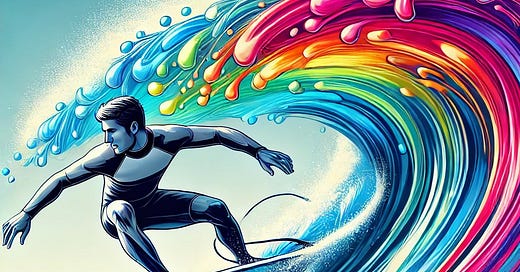Mind Candy is a newsletter on practical philosophy and human flourishment—aka how to live the “the good life.” Each month we tackle a new theme. This month we’re exploring creativity.
“Lives of great men all remind us
We can make our lives sublime,
And, departing, leave behind us
Footprints on the sands of time”
Creativity is the freedom to transform the world around us. Every time we’re given the opportunity to be creative, we’re given an opportunity to mold the world, at least in part, a little to ourselves.
This ability to take some control not only over ourselves but of the world we inhabit is an intoxicating feeling. So much of life is lived outside of control, constantly reacting to events and looking for our opportunities to insert some control back into the scenario.
So when we’re given the freedom to be creative, it is incredibly powerful to our soul and can provide a renewed sense of independence. Our ability to act upon the world using our own creativity is a form of pure freedom we crave.
Jean-Paul Sartre once used the analogy of skiing to describe how our actions not only imprint on the world, but change it.
“To ski means not only to enable me to make rapid movements and to acquire a technical skill, nor is it merely to play... I am changing the matter and meaning of the snow.”
This is perhaps at the heart of all creativity. Not only a desire to create, to bring forth life from the depths of our soul, but to do it in such a way that it touches the world and thus changes it, wherein the very presence of it alters the existence of reality.
Sometimes it is big, like the iPhone, a disruptive force that completely alters the path of every day life. At other times it is subtle, like the request to take someone’s photo and hear a bit of their story, as Brandon Stanton did with Humans of New York.
Because that is the thing about creativity, yes, it is for us—it frees us and makes us feel alive and makes it so we are leaving behind our footprint—but also, it connects us to so many other people, most of whom we will never know or see.
Van Gogh only started being recognized for his work towards the end of his life and his fame after his passing. John Kennedy Toole’s life’s work, A Confederacy of Dunces, likewise only became popular after his death—his mother and Walker Percy helping to get it published where it would go on to find mainstream success and earn Toole a posthumous Pulitzer Prize.
Our creative acts, both big and small, leave an imprint on the world and deep within us we recognize this power and are drawn to it.
Creativity reminds us of what Marcus Aurelius summarized so well, while we pass away, what we leave behind does not vanish with us, rather, it is transformed by all those who we interacted with, all those who we were able to touch whether seen or not.
So while creativity starts out for ourselves, its real impact is on all those who experience it.
3-Bullet Summary:
The creative spirit is the ultimate form of freedom, allowing for uncontrolled application on the world.
When we apply creativity in the world, we leave behind a piece of ourselves, both in the form of what we have done and in the impact it leaves for its existence.
This ability to be creative is what impacts the world in many ways, most of which we unfortunately will never see. But it leaves behind footprints for others to see and in turn transform for the next generation.
Until next time,
D.A. DiGerolamo
We are a participant in the Amazon Services LLC Associates Program, an affiliate advertising program designed to provide a means for sites to earn advertising fees by advertising and linking to Amazon.com.









